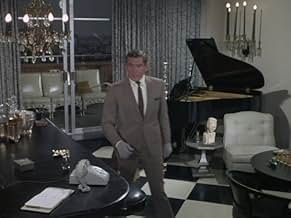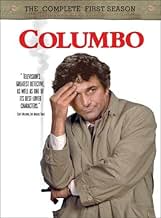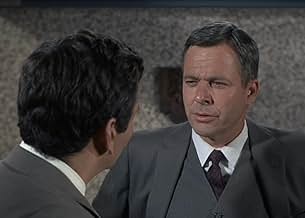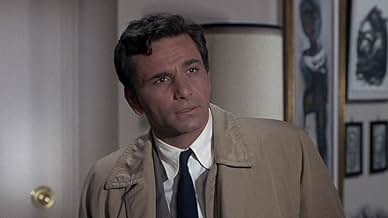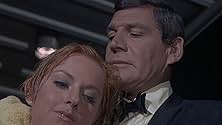NOTE IMDb
7,9/10
6,2 k
MA NOTE
Ajouter une intrigue dans votre langueA psychiatrist uses a patient he is having an affair with to help him kill his wife, but his perfect alibi may come apart at the hands of a seemingly befuddled LAPD lieutenant.A psychiatrist uses a patient he is having an affair with to help him kill his wife, but his perfect alibi may come apart at the hands of a seemingly befuddled LAPD lieutenant.A psychiatrist uses a patient he is having an affair with to help him kill his wife, but his perfect alibi may come apart at the hands of a seemingly befuddled LAPD lieutenant.
- Réalisation
- Scénario
- Casting principal
Frank Baker
- Man in Park
- (non crédité)
Michelle Breeze
- Party Guest
- (non crédité)
Jim Creech
- Policeman in Hospital
- (non crédité)
Ed Haskett
- Party Guest
- (non crédité)
Robert Hitchcock
- Pilot
- (non crédité)
Clark Howat
- Doctor
- (non crédité)
Jeff Lawrence
- Party Guest
- (non crédité)
Avis à la une
Prescription: Murder does have its slow moments and personally I think there were better entries in the series, nonetheless this is a strong start to a wonderful detective series. The story is not too hard to follow but it isn't exactly simple either with a fine denouncement, while the script is superb and allows the actors to have fun. The photography and locations are striking, the score is suitably intense and the direction is secure. The acting is very good too. The supporting players are good particularly Katherine Justice, but the two leads are excellent, Peter Falk owns the part of Columbo while Gene Barry is perfect as the smug psychiatrist who murders his wife. Columbo's methods of bringing down Fleming is somewhat haphazard, but it is still a delight to watch. Overall, a very strong start. 9/10 Bethany Cox
If you look up "Columbo" on IMDB, this episode isn't listed. Instead, it's listed as a separate movie. Regardless, "Prescription: Murder" is the first appearance of Lieutenant Columbo.
The first 35-40 minutes are all things leading up to a murder as well as working to conceal it. Columbo himself doesn't make an appearance until later.
Dr. Flemming (Gene Barry) is NOT a particularly nice psychiatrist. It seems he's been cheating on his rich wife and is tired of the pretense. So instead, he murders his wife in an elaborate way and uses his lover as an alibi. However, despite the crime appearing like a simple case of a robber killing a surprised housewife, Columbo isn't convinced and seems to think through most of the film that Dr. Flemming was responsible. The problem is that Flemming is a cool customer...and getting him to confess isn't going to happen. So how will Columbo manage to prove that the grieving husband is, in fact, a cold-blooded killer?
This is a very good beginning for the series. The writing is very good and how Columbo tricks Flemming is pretty cool. Overall, well worth seeing--particularly if you love murder mysteries.
The first 35-40 minutes are all things leading up to a murder as well as working to conceal it. Columbo himself doesn't make an appearance until later.
Dr. Flemming (Gene Barry) is NOT a particularly nice psychiatrist. It seems he's been cheating on his rich wife and is tired of the pretense. So instead, he murders his wife in an elaborate way and uses his lover as an alibi. However, despite the crime appearing like a simple case of a robber killing a surprised housewife, Columbo isn't convinced and seems to think through most of the film that Dr. Flemming was responsible. The problem is that Flemming is a cool customer...and getting him to confess isn't going to happen. So how will Columbo manage to prove that the grieving husband is, in fact, a cold-blooded killer?
This is a very good beginning for the series. The writing is very good and how Columbo tricks Flemming is pretty cool. Overall, well worth seeing--particularly if you love murder mysteries.
A baby-faced Peter Falk makes his first appearance in this 1967 TV movie as the world-famous detective Columbo, which was followed 4 years later by another TV movie and an exceptionally successful TV series.
An excellent, well-paced, cleverly-crafted mystery which spends a lot of time establishing and developing Columbo's characterisation - the dogged determination and persistence through seemingly trivial questions; the display of deceptive absent-mindedness and ineptitude; the constant references to his family etc. are all underpinned by the cigar, the mac and the generally scruffy appearance (although his overall appearance here is rather more tidy).
Undeniably, in hindsight, Columbo characterisation and Falk's performance is a little raw here, for it would take a little more time to fine-tune both things: nevertheless, Falk still does a great job with the complexities of the character and gives a smooth, unruffled performance.
The plot is purposely straightforward and relatively thin and there are not the plethora of accompanying clues and trivial pieces of evidence that invigorate the vintage episodes of the series, but you have to remember that this TV movies was the platform for the Columbo character.
Gene Barry gives a fine performance as the murderer: he certainly relishes his role; effortlessly displaying his character's cold-heartedness, self-confidence and smugness in equal proportions. His scenes with Falk have a marked air of tension about them, as Barry's character progressively shows disdain and arrogance towards the protagonist.
The ending is clever, especially as the murderer continually thinks that he has got away with his crime; the way Columbo unmasks him is superbly ironical.
The only problem watching this film is that most people encountered the Columbo TV series, prior to watching the "introductory" TV movies, so it can be a little unnerving, yet, on its own account, it's a very accomplished piece of work. Furthermore, the best detective to hit our TV screens was born!
An excellent, well-paced, cleverly-crafted mystery which spends a lot of time establishing and developing Columbo's characterisation - the dogged determination and persistence through seemingly trivial questions; the display of deceptive absent-mindedness and ineptitude; the constant references to his family etc. are all underpinned by the cigar, the mac and the generally scruffy appearance (although his overall appearance here is rather more tidy).
Undeniably, in hindsight, Columbo characterisation and Falk's performance is a little raw here, for it would take a little more time to fine-tune both things: nevertheless, Falk still does a great job with the complexities of the character and gives a smooth, unruffled performance.
The plot is purposely straightforward and relatively thin and there are not the plethora of accompanying clues and trivial pieces of evidence that invigorate the vintage episodes of the series, but you have to remember that this TV movies was the platform for the Columbo character.
Gene Barry gives a fine performance as the murderer: he certainly relishes his role; effortlessly displaying his character's cold-heartedness, self-confidence and smugness in equal proportions. His scenes with Falk have a marked air of tension about them, as Barry's character progressively shows disdain and arrogance towards the protagonist.
The ending is clever, especially as the murderer continually thinks that he has got away with his crime; the way Columbo unmasks him is superbly ironical.
The only problem watching this film is that most people encountered the Columbo TV series, prior to watching the "introductory" TV movies, so it can be a little unnerving, yet, on its own account, it's a very accomplished piece of work. Furthermore, the best detective to hit our TV screens was born!
For the legion of Columbo fans, this is the one that began it all, "Prescription: Murder," a play about a sloppy, fumbling, genius detective that was to star Thomas Mitchell on Broadway. We can thank, sadly, Mitchell's sudden death for the fact that they play never made it and was turned into a teleplay.
This particular episode sets up the formula for future Columbos: A powerful, wealthy, and/or privileged person commits a clever murder, can't believe their luck that this idiot is on the case, and goes down in flames. The powerful, wealthy, and/or privileged person is psychiatrist Gene Barry, who kills his wife (the always excellent Nina Foch) and sets himself up with an alibi with the help of his young patient, an actress. Brilliant though his scheme may be, Columbo is on to him immediately. And, as usual, 'twas ego killed the beast.
It took a while for Columbo to actually become a series, but it eventually did, rotating with other shows on the NBC Sunday Night Mystery Movie. But this is where it all began, with a surprisingly youthful but ever sloppy Columbo matching wits with a criminal. A classic.
This particular episode sets up the formula for future Columbos: A powerful, wealthy, and/or privileged person commits a clever murder, can't believe their luck that this idiot is on the case, and goes down in flames. The powerful, wealthy, and/or privileged person is psychiatrist Gene Barry, who kills his wife (the always excellent Nina Foch) and sets himself up with an alibi with the help of his young patient, an actress. Brilliant though his scheme may be, Columbo is on to him immediately. And, as usual, 'twas ego killed the beast.
It took a while for Columbo to actually become a series, but it eventually did, rotating with other shows on the NBC Sunday Night Mystery Movie. But this is where it all began, with a surprisingly youthful but ever sloppy Columbo matching wits with a criminal. A classic.
This is a fascinating early outing for one of the greatest TV characters ever created. Filmed about three years before the great man was given a regular series, in an uncanny way it both stands alone and acts as a guide to what was to come.
The Columbo formula is in place: immediate suspicion leads to the hounding of the suspect until Columbo's psychological pressure is too much to bear and the victim is helplessly trapped.
I like to think that Columbo spent the years between 1968 and 1971 refining his methods, becoming subtler and more suggestive in his probing while letting his appearance become dowdier and even less threatening. Certainly this is one of the few occasions when he loses his temper on a case. Even when Columbo loses his temper, he is generally working to provoke a reaction.
There are some nice directorial touches here, too, particularly a cut based on the murderer's hands, a hand hitting a piano keyboard with a discordant 'plunk' (very Hitchcock) and Columbo's reflection materialising in a broken mirror.
After years of watching Columbo I am surprised anyone in Los Angeles even thinks about committing a murder. Surely the man is a legend in the local media? What do you mean: 'He's not real'?
The Columbo formula is in place: immediate suspicion leads to the hounding of the suspect until Columbo's psychological pressure is too much to bear and the victim is helplessly trapped.
I like to think that Columbo spent the years between 1968 and 1971 refining his methods, becoming subtler and more suggestive in his probing while letting his appearance become dowdier and even less threatening. Certainly this is one of the few occasions when he loses his temper on a case. Even when Columbo loses his temper, he is generally working to provoke a reaction.
There are some nice directorial touches here, too, particularly a cut based on the murderer's hands, a hand hitting a piano keyboard with a discordant 'plunk' (very Hitchcock) and Columbo's reflection materialising in a broken mirror.
After years of watching Columbo I am surprised anyone in Los Angeles even thinks about committing a murder. Surely the man is a legend in the local media? What do you mean: 'He's not real'?
Le saviez-vous
- AnecdotesColumbo establishes two of his most famous trademarks by needing to borrow a pencil and, just before leaving the psychiatrist's office, by saying, "There's one more thing . . . ".
- GaffesThe outline of Carol Flemming's 'body' is on the floor, but since she survived the attack and died later in the hospital, (unless that was a ruse to trip-up the suspect) there would not have been a reason to mark off where the first responders found her, since injured people are removed and transported quickly to save their lives, and not subject to being traced before they are moved. Additionally, the location of the tape was not a match to where she was initially on the floor.
- Citations
Lt. Columbo: There's just one more thing, sir!
- Crédits fousThe beginning credits feature a series of brightly colored animated splotches. The splotches were meant to resemble the ink blots used in a Rorschach test, as the villain in this movie was a psychiatrist.
- ConnexionsFeatured in Peter Falk versus Columbo (2019)
Meilleurs choix
Connectez-vous pour évaluer et suivre la liste de favoris afin de recevoir des recommandations personnalisées
Détails
- Date de sortie
- Pays d’origine
- Langue
- Aussi connu sous le nom de
- Prescription: Murder
- Lieux de tournage
- Stahl House, Case House 22 - 1635 Woods Drive, West Hollywood, Californie, États-Unis(Home of character "Joan Hudson")
- Société de production
- Voir plus de crédits d'entreprise sur IMDbPro
- Durée1 heure 40 minutes
- Mixage
- Rapport de forme
- 1.33 : 1
Contribuer à cette page
Suggérer une modification ou ajouter du contenu manquant

Lacune principale
By what name was Columbo: Inculpé de meurtre (1968) officially released in India in English?
Répondre
